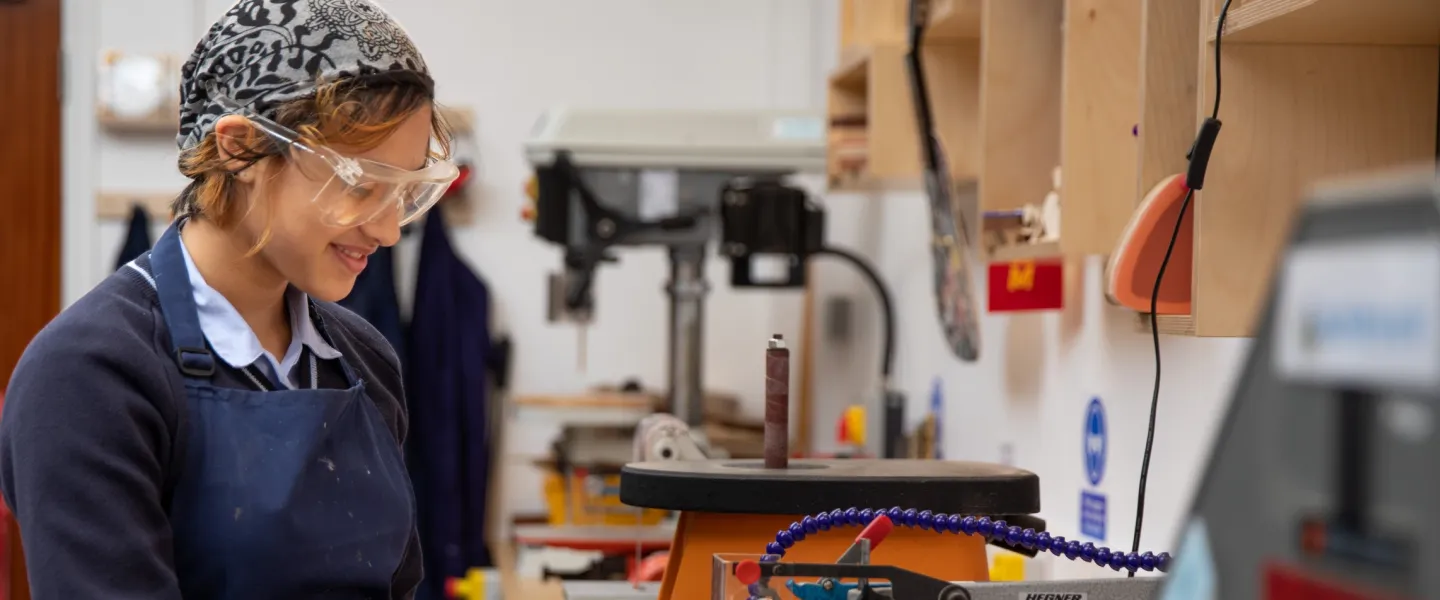An overview of Design and Technology at KS3 and KS4
Design and Technology is compulsory in Year 7 and taught through practical projects using the iterative design process. In Year 8 and 9 pupils may opt to continue with the subject. AQA Design and Technology is offered at GCSE and AQA Design and Technology: Product Design is offered at A-level.
Design Technology is taught in a multimedia workshop by qualified and experienced staff, supported by a technician. A diverse range of specialist skills are covered in the course of study.
Creativity is allowing yourself to make mistakes. Design is knowing which ones to keep.
The aims of the department are to:
- Develop the pupils’ capability, through combining their designing and making skills with knowledge and understanding to design and make products;
- Encourage technological awareness and confidence so that pupils will be able to play an effective part in the technological world of the twenty-first century;
- Stimulate the development of a range of designing and making skills;
- Develop knowledge and understanding of materials and components, systems and control and structures;
- Encourage the development of problem-solving skills.
Key stage 3
Over the three years spent in Key Stage 3, through individual and group work, focused practical tasks, skills-based exercises and individual design and make based projects, pupils cover a variety of skills to help prepare them should they decide to opt for GCSE. This includes:
- Use of hand tools and machines
- Designing and making using iterative design methods, including developing a design brief and specification, research skills, developing and modelling designs, planning and making their designs, and testing and evaluating their product, both during and at the end of the making process.
- Risk assessment and Health and Safety in the workshop.
- CAD/CAM - using 2D Design and associated machinery, and other graphic software packages.
- Printed Circuit Board soldering and Electronic Systems and Control programming.
AQA GCSE Design and Technology (Years 10 and 11)
Pupils can opt to study this subject. GCSE Design and Technology places emphasis on understanding and applying iterative design processes and will prepare students to participate confidently and successfully in an increasingly technological world. Students will gain awareness of and learn from the wider influences on Design and Technology including historical, social, cultural, environmental and economic factors. Students study core technical and design-and-make principles, including a broad range of design processes, materials techniques and equipment. Assessment is through the production of a Design and Make project (Non-Examined Assessment), which is worth 50% of total marks, and a 2-hour written paper which is worth the remaining 50% of the marks.
AQA A-level Design and Technology: Product Design (Years 12 and 13)
This creative and thought-provoking qualification gives you the practical skills, theoretical knowledge and confidence to succeed in several careers, especially those in the creative industries. You will investigate historical, social, cultural, environmental and economic influences on design and technology, whilst enjoying opportunities to put your learning in to practice by producing prototypes of your choice. You will gain a real understanding of what it means to be a designer, alongside the knowledge and skills sought by higher education and employers.
A-level Design and Technology: Product Design requires you to engage in both practical and theoretical study and you will be examined in both.
Assessment is through a practical non-examined assessment (NEA), the context of which is decided by the student. The NEA is worth 50% of A-level and is evidenced through a written or digital design portfolio and photographic evidence of final prototype. There are also two written papers. Paper 1 is about technical principles and is worth 30% of the A-level, and Paper 2 is about designing and making principles and is worth 20% of the A-level.
This qualification is linear, so you will sit all your Paper 1 and Paper 2 and submit all your non-examined assessment (NEA) at the end of the course.
Curriculum Enrichment
Key Stage 3 pupils have the opportunity to attend DT club where they are able to use a variety of tools, equipment and materials to practise their creativity, problem-solving and making skills. Key Stage 4 pupils are supported throughout their DT GCSE with weekly lunchtime sessions in both the designing and making and theory areas of the subject.
Students will have the opportunity to attend the ‘New Designers’ exhibition, which is a showcase of the best work of design-related degree courses from universities across the country.
